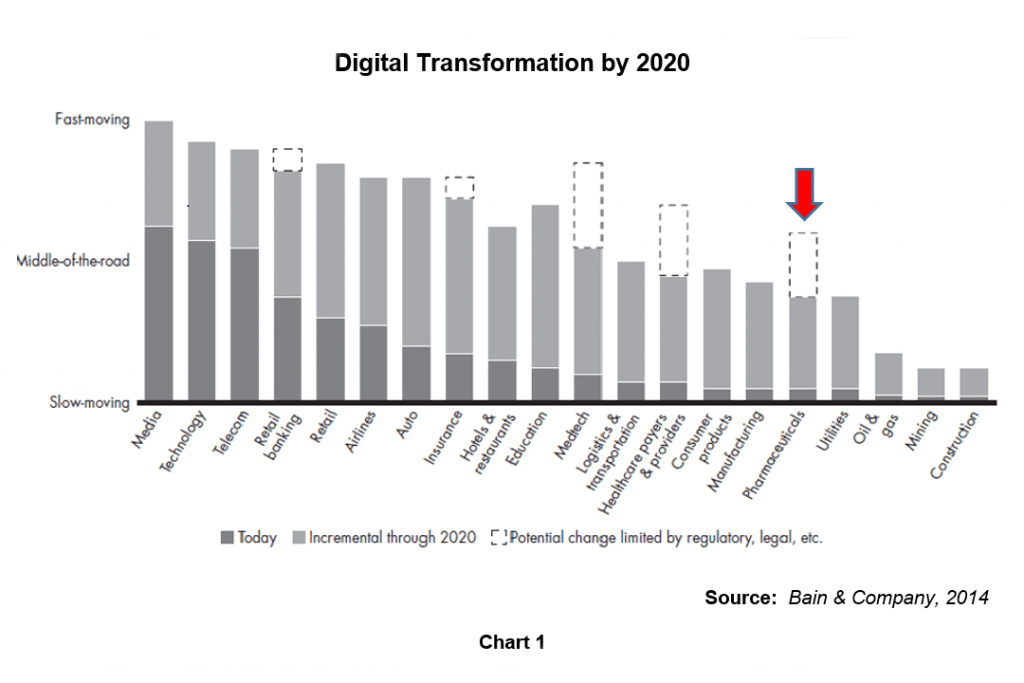
Driving this change is intense competition and the overwhelming need for better processes, as recommended in the revised International Conference on Harmonisation Guideline released in 2016.[i] This guideline, the first update in 20 years, notes that ongoing technology adoption offers significant opportunities for greater efficiencies. In particular, advances in tools that enable electronic workflow and electronic data recording and reporting are facilitating implementation of new methodologies. Furthermore, according to the guideline, spearheading this effort is the sponsor, who “should implement a system to manage quality throughout all stages of the trial.”
Given this global message and the dubious status of clinical trial efficiency, technology-driven process improvement is a top priority industry-wide. Currently, an estimated 50% of clinical trials are behind schedule due largely to challenges with patient enrollment.[ii] Moreover, for Phase II and III trials, it can take nearly 17 months for all approved investigative sites to be initiated.[iii] These statistics align with research conducted by the Tufts Center for the Study of Drug Development, which found that 35% of stakeholders still rely on spreadsheets to launch studies,[iv] and clinical trial cycle times have stagnated for more than a decade.[v]
Major advances are underway, focusing increasingly on end-to-end solutions, starting with purpose-built tools for study startup that useworkflows to standardize processes. Data are entered once and thenflow across the clinical trial continuum. This is happening due to the proliferation of cloud-based tools and the use of an application program interface, which can integrate information from various solutions, such as study start-up tools, the clinical trial management system, and electronic data capture.[vi] The essential documents can then flow into the electronic trial master file, improving quality and audit-readiness. This system-wide approach is a major improvement over earlier, less sophisticated iterations that involved a series of siloed non-integrated point solutions.
Going forward, it is expected that continued technology adoption will be a key focus for stakeholders looking to remain competitive in the ever-more complex realm of clinical trials.
Author:
Ann Neuer MBA
Medical deScriptions LLC
[i] ICH Harmonised Guideline. Integrated Addendum to ICH E6(R1): Guideline for Good Clinical Practice E6(R2). November 2016. Available at: http://www.ich.org/fileadmin/Public_Web_Site/ICH_Products/Guidelines/Efficacy/E6/E6_R2__Step_4_2016_1109.pdf. Accessed January 26, 2018.
[ii] Gwinn B. Metrics for Faster Clinical Trials. PharmaVoice. June 2011. Available at: http://www.pharmavoice.com/article/2011-06-metrics-for-faster-clinical-trials/. Accessed January 23, 2018.
[iii] START (Start-up Time And Readiness Tracking) Study. Tufts Center for the Study of Drug Development-goBalto, 2012. Available at: https://www.gobalto.com/research-report-tufts-2012. Accessed January 23, 2018.
[iv] Harper B, Wilkinson M, Lamberti MJ, Getz KA. Tufts CSDD-goBalto Site Selection Market Research (START II). Tufts Center for the Study of Drug Development-goBalto, 2017.
[v] Getz K. Assessing and addressing site identification and activation inefficiencies. Tufts Center for the Study of Drug Development. March 2016.
[vi] Study Startup: The Last Major Frontier in Automating Clinical Operations: Crossing the chasm and completing the eClinical stack. goBalto. 2016.



